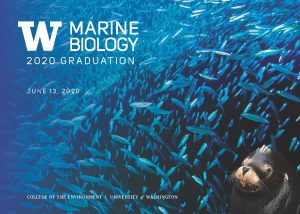Scientists organize to tackle crisis of coral bleaching

Coral bleaching is a significant problem for the world’s ocean ecosystems: When coral becomes bleached, it loses the algae that live inside it, turning it white. Corals can survive a bleaching event, but while they are bleached they are at higher risk for disease and death. Now an international consortium of scientists, including Marine Biology instructor Jacqueline Padilla-Gamiño, has created the first-ever common framework for increasing comparability of research findings on coral bleaching.
Read moreEarly-arriving endangered Chinook salmon take the brunt of sea lion predation on the Columbia

A new University of Washington and NOAA Fisheries study found that sea lions have the largest negative effect on early-arriving endangered Chinook salmon in the lower Columbia River. The results of this study will publish Oct. 18 in the Journal of Applied Ecology.
Read moreSome polar bears in far north are getting short-term benefit from thinning ice

The small subpopulation of polar bears in Kane Basin were doing better, on average, in recent years than in the 1990s. The bears are experiencing short-term benefits from thinning and shrinking multiyear sea ice that allows more sunlight to reach the ocean surface, which makes the system more ecologically productive.
Read moreCitizen Scientists Help Count Deep 7 Bottomfish in Hawaii

The Pacific Islands Fisheries Science Center is launching a new citizen science project called OceanEYEs and is seeking volunteers to help find Deep 7 bottomfish in underwater videos.
Hana Ra’s (BS Biology, 2020) interest in citizen science began when SAFS Professor Julia Parrish gave a presentation on the Coastal Observation and Seabird Survey Team (COASST) program in Ra’s marine biology course.
New studies show how to save parasites and why it’s important

An international group of scientists has laid out an ambitious global conservation plan for parasites. A related paper led by the University of Washington found that responses of parasites to environmental change are likely to be complex, and that a changing world probably will see both outbreaks of some parasites and a total loss of other parasite species.
Read morePainting a Picture: Student Spotlight with Melina Wettstein

Melina Wettstein, an undergraduate at the University of Washington, is pursuing a double major in marine biology and math. After she graduates, Melina plans to pursue a career as a researcher—something she has already made strides toward by publishing her research in the College of the Environment’s undergraduate journal, FieldNotes. She is also an exuberant artist, expressing her creativity through a love of painting and drawing.
Read moreBig decisions: New book examines case studies in “Structured Decision Making”

In their most recent book, Sarah Converse (unit leader, USGS Washington Cooperative Fish and Wildlife Research Unit, and UW associate professor in Aquatic and Fishery Sciences and Environmental and Forest Sciences) and her co-editors explore how managers can use a structured decision making approach to aid in solving natural resource problems.
Read moreJacqueline Padilla-Gamiño Recognized by UW Center for Latino Health

The UW Center for Latino Health has recognized 32 UW Latinx faculty for scholarly achievements, including Jacqueline Padilla-Gamiño, assistant professor at the UW School of Aquatic and Fishery Sciences and instructor for Marine Biology, who has been honored for the second year in a row. This annual event honors the scholarly achievements of Latina and Latino faculty across the three campuses of the University of Washington.
Read moreSpring 2020 Graduation

It is with deep pride, joy and honor that we present the first graduating class of the Marine Biology major. We welcome our graduates into our academic ranks and we celebrate with them their outstanding achievements. We especially acknowledge and thank the community that supported our students, their loved ones and friends. Your graduate is a testament to your dedication and strength. The Marine Biology Major is the result of a highly creative partnership between the School of Aquatic and Fishery Sciences, the School of Oceanography and Friday Harbor Laboratories. As such, the Major brings together a diverse and unrivalled set of subjects in the Marine Sciences, taught by a highly dedicated faculty. We honor our students for the deep commitment that they have shared with us and wish them the very best in their future lives.
Read moreCollege researchers, faculty and staff working together for UW Medicine

In times of extreme duress, a shining beacon of hope can come from communities working together to support one another. The University of Washington Medical Center, in preparation for an influx of patients in the coming weeks, recently put out a call for medical supplies. Researchers from around the College of the Environment answered that call, realizing that much of what the Medical Center needed were common items found in research labs, and quickly mobilized to collect donations and drop them off at UW Surplus.
Read more